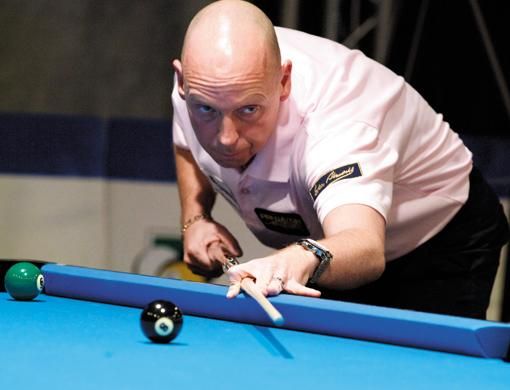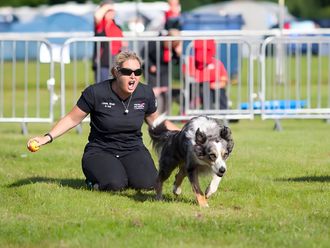Ralf Souquet, the world number one pool champion in the nine-ball and eight-ball versions, is talented, committed and has dedicated his life to the sport. He tells Shiva Kumar Thekkepat what makes him tick.
Ralf Souquet is not feeling too well. His stomach is acting up. He has a few games and interviews scheduled for later in the day and he doesn't want to miss any of them. He rests for a few minutes, then rushes off for a game of pool. A couple of hours later he returns for the interview brimming with good humour.
Among the many titles he holds, Souquet is also the current holder of the World 8-Ball Pool Championship held in Fujairah last year. He could well afford to keep away from the Knight Shots Inc.-sponsored tournament held at the Big Boys Toys exhibition in Abu Dhabi recently. But so passionate and committed is he to the game that he would rather suffer discomfort at the pool tables than relax on his comfortable bed during a major pool event.
What makes a champion? "A lot of things," he replies. "First of all, it helps if you have natural talent... If you are good in Maths or Physics, you will know exactly how the balls would move. You need to have very high levels of concentration and be able to sustain it over long periods; you could play three to four matches a day, and each match could last two-to-two-and-a-half hours. To play eight hours a day you have to be physically [and mentally] fit. So, naturally you have to be into sports. Some run, some cycle; I try to run more than an hour every day. You need to work on the table as well, practice as much as you can.
"You also have to be brutally honest about your abilities."
Souquet is, and doesn't think twice before clinically analysing his form.
He admits he does not get to practice as much as he would like. "...because I am travelling all over the world 250 days a year, so basically my practice is restricted to playing in tournaments. I rarely have time off. When I do get the time, I'll spend around two hours at the table and work on things I know I am not so good at. You have to work on your offence as well as defence because it has to be a good combination of both."
This from a player who is reputed to be the best! "One thing I've learnt is that you are never going to be perfect," he says. "You learn something new about the game every single day. That's the great thing about playing pool. You never know what's coming."
What is his frame of mind when at the table? Souquet is disarmingly honest: "I just try to relax and get into the proper mindset for the game. While playing in a tournament, I keep to myself, try to concentrate on what I want to achieve, and on my game. Then I go into the game and everything else is blanked out. There's only me, the cue and the balls. I don't do interviews or autograph sessions before the match. The only way to play is to stay focused."
As he speaks a youngster approaches him for an autograph. Souquet obliges, and grins, "I am the big attraction here, so people come up and ask to take a picture with me, or sign an autograph. I can understand that, but it makes it really hard to focus and prepare for the match."
Are there any techniques he employs when preparing for a match? "No," he replies. "I don't meditate or do yoga. I do certain things... a pre-routine that is different for every tournament. This usually helps me stay focused."
The glorious uncertainty of the game is what keeps him focused and going. "It depends on so many things; you have different situations, different layouts, conditions, more humidity or less humidity, sometimes more people in the room, sometimes less.
''The number of tables and sizes may differ, the size of the pockets may differ... it's only the balls that are the same, the only thing that's consistent. These are factors you have to adjust to at every tournament. Table heights could vary between 78cm and 84cm, and six centimetres could make a lot of difference to a man of my height," says the 171-cm tall Souquet.
"Sometimes the table is too high and I find it difficult to reach the cue ball when it is in the middle of the table. It's like when you have to serve on a tennis court where the net is 6cm higher than what you are used to playing."
With conditions varying depending on the venue of the event, Souquet can do only one thing: try to keep his game consistent. "I have so many challenges, but I try to play my best game all the time. That is my goal. I try to have fun at the table."
But he is "never 100 per cent satisfied, because there is always room for improvement. I make mistakes but when I realise it, I start to work on them. The most important thing for me is that I am really happy with my game."
The burning urge to win is not the only motivation. "It's not njust about winning. Of course, winning is nice and feels great," he says, "but there are some victories which are sweeter because you know you have played well." Hardly what you would expect a number one player to say, but then Souquet has been there, slipped a bit and got back again. "Once you've reached a position, it is very hard to retain the spot. When you are number five you are gunning for number one. But when you are number one, then you are being targeted. Staying on top of the hill is harder than climbing the hill," he says.
So how does he stay on top?
"I am always looking for new challenges, like tournaments that I haven't won yet. I have quite a lot of goals still to achieve. The number one [goal] is to be the best and stay the best."
The game stays fresh for Souquet because of the various disciplines he can play in. "We now have four tournament disciplines: nine-ball, eight-ball, ten-ball and 14-ball." He has won the world titles in the first two. The 14-ball is also called straight pool while the ten-ball is pretty much a new game in the circuit. It has been played for many years, but the world governing body recognised it as the fourth discipline only last year. They also changed the rules a bit, so it has become a new game. "Right now my goal is to win the title in the ten- and 14-ball events."
Souquet started playing pool at the age of six, and even at that age played between five and eight hours every day. "I started in my parents' club in 1974.They had a seven-foot table and my father played. He showed me the basics of the game for the first couple of years but he never pushed me to do it. I was just fascinated by the balls and really loved the game from the start.
"As soon as I came back from school I did my homework and when I was done, I would grab a cue stick and start to play. I was really addicted to it, and still am! I also played soccer until I was 12. Once I started playing pool I really didn't have time for my school friends except when I played soccer with them.
''At a certain point I had to make a decision when my pool matches clashed with soccer games. Even though I was pretty good at soccer (our team won three years in a row), I decided to quit soccer and concentrate on pool when the soccer coach felt I wasn't giving it my all. In pool I had to only worry about myself; in soccer, I had to depend on my teammates too."
What does he think of the Paul Newman film The Hustler, which depicted a very bleak world of pool sharks in the US?
"I've seen the movie, and think it's a good one. That was how pool was played in the US maybe like 20 years ago, and in some instances perhaps still is. But this is the not the way the pool scene works nowadays. Certainly, it was not like that anywhere else than perhaps in the US. There are probably some very good players who exist in this sub-culture, who could turn professional, but don't for whatever reasons."
Probably because there is no big money in pool? "That's true," he agrees. "The highest is the World Championships where the prize money is $100,000. It's quite good money, but not when you compare it with the other sporting disciplines. Even snooker. Considering how many people play pool around the world, the money should be much more. That's not the case yet, but hopefully things will change."
Souquet feels it is the attitude of the pool fraternity that's keeping it back. "The reason could be that we are not organised enough. We have a federation that governs us, but it's not very strict.
''For instance, there is a dress code for pool players black dress pants, black dress shoes, black socks, at least a polo shirt with a collar, but you come across so many players in jeans and sneakers.
''They may not know any better, but rules are rules. You won't see tennis players at a tournament in jeans. The same applies to other sports. They all follow dress code. But in pool, the organisers are not strict enough, and in my opinion that is one reason why the sport just doesn't grow.
''Most pool players are also very lazy. I wish there were stricter rules. If it was well-organised, it would attract more sponsors too. I am trying to keep the standards as high as possible and am also trying to educate other players about the rules."
Another of Souquet's dreams is to see pool being played at the Olympic Games.
"I want to participate when pool is officially recognised at the Games. Right now we are recognised by the Olympic Committee, we are participating in the World Games, which is like the Olympics for the sports not included in the Olympics. This year the World Games will be held in Kaohsiung, Taiwan, and I have qualified for it. My goal this year is to win a gold medal."
Souquet sees a a great future for pool in the UAE.
"I have been going to Fujairah since 2004 and it just gets better and better. The Fujairah Tournament has firmly established itself on the world tour and all the players look forward to visiting the UAE. Pool can be pretty big here. What better game than pool for this country, especially in summer when you can't step outdoors.
''Dubai needs big exhibition tournaments, and I am sure it will happen. Maybe something in combination with Knight Shots, which is the company for pool-related activities in the UAE. With the World Championships in Fujairah, the Knight Shots matches in Abu Dhabi and a possible big international event in Dubai, you'll have three big events in the UAE and that's probably more than most countries in the world have."
Would he have done anything differently if he had the chance?
"Probably not," he grins. "Pool has always been my life and I am not trying to change that. I love to travel, meet different people and see different cultures. If you can make your hobby into your job, what could be better?"











